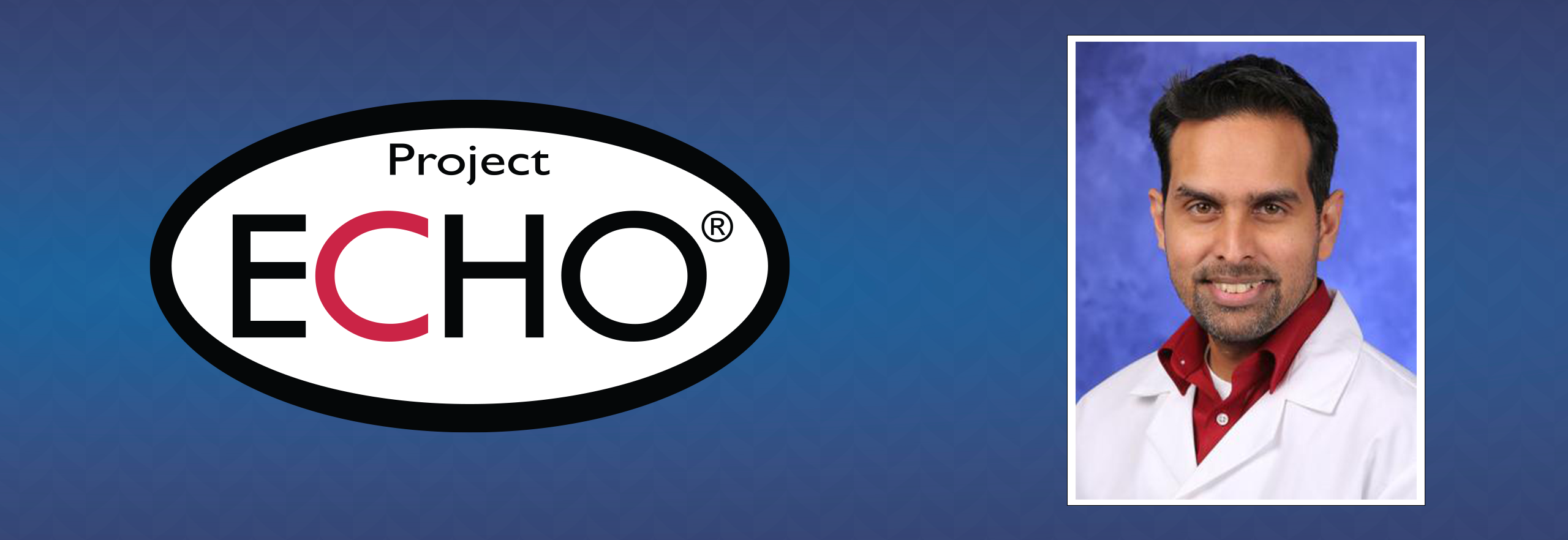Project ECHO Participant Spotlight: Ramnarine Boodoo

Project ECHO Spotlight interviews feature advocates, participants or team members discussing their experiences with ECHO. Read more ECHO Spotlights.
Ramnarine Boodoo, MBBS
Student Mental Health in Secondary Schools
Introduction
Ramnarine Boodoo, MBBS, has been engaged as a hub team member with multiple Project ECHO series at Penn State addressing child and adolescent mental health. Most recently, he served as a hub expert for the “Student Mental Health in Secondary Schools” series. A recipient of the 2023 Dean’s Award for Excellence in Teaching, Boodoo is a leading expert in both child and adolescent mental health. His most recent research examines gun violence advocacy as a part of medical education in the USA.
Boodoo grew up in Trinidad and Tobago where he received his medical training. He completed his residency at the University at Buffalo, Buffalo, NY and a fellowship at University of New Mexico, Albuquerque, NM. He also worked in the Alabama community for a short time. Currently, Dr. Boodoo is a child and adolescent psychologist and Assistant Professor of Psychiatry and Behavioral Health, Division of Child Outpatient Services at Penn State College of Medicine where he works in a large clinic serving a diverse child and adolescent patient population.
Watch as Ramnarine Boodoo, MBBS, shares more about his ECHO experience.
How Did You Become Involved With Project ECHO?
“I had known about Project ECHO from my fellowship, but I never participated in any ECHO sessions at the University of New Mexico. When ECHO came to Penn State it was senior colleagues who spoke to me about it and about the need for an ECHO-like model to disseminate specialist clinical information to the community, community providers, primary care docs, and other individuals so the quality of psychiatric care in the community could improve.”
Why Did You Decide to Participate in the Childhood and Adolescent Mental Health ECHO Series?
“We had recognized the need for this in the community, particularly in schools. So, when the opportunity came along and was presented to me by a senior colleague, I thought it was something that would be very worthwhile. (I thought it would be) an experience for not just enhancing psychiatric care in the community and in schools but also an opportunity for my own personal growth and development.”
What is it Like to Take Part in an ECHO Series?
“I would describe participation in ECHO as varying depending on whether you are a guest speaker or whether you are a dedicated Hub team member who is involved in managing the flow of the ECHO session. If you are a guest speaker, meaning you’re essentially the content expert for that session, it can be a little bit of a challenge because you only have 15 minutes or less to give your talk. If you have a lot of information to share, getting all your information into that time can be difficult. On the flip side though, once you’re able to do that and share this information and receive the feedback from the participants, it is incredibly gratifying. You can really see that you’ve made an impact and that folks are going to leave the session with something valuable.”
What Did You Learn About What School Staff Are Facing Post-Pandemic From the Student Mental Health in Secondary Schools ECHO Series?
“The pandemic took a toll on youth mental health across the globe and schools were hit especially hard. Nobody was prepared for online learning when the pandemic hit. What we realized was that online learning is not for everybody – A lot of kids really struggled not just academically. School provides more than just didactic learning. Kids get a chance to participate in social activities, connect with peers, develop social skills, learn how to manage situations, and learn how to interact with people who are senior. These things were lost during the pandemic for many, many people – coming out of the pandemic there was again a bit of an adjustment, not just for students, but for staff as well. Post-pandemic it became clear that staff were overwhelmed, students had a lot more mental health issues, and parents seemed to be perhaps a little bit less understanding, having a little bit of a shorter fuse. All these factors played into it being a less than ideal situation post-pandemic. It sounds like perhaps things are starting to even out now.”
How Would You Summarize Your Experiences With ECHO?
“This series really allowed me to connect with and empathize with school professionals as a child and adolescent psychiatrist. I communicate with these folks all the time but mostly formally and in a very impersonal way, not really understanding or recognizing what their roles and needs are. This series really gave me an opportunity to do that, to see things from their perspective. It gave me a chance to understand their struggles and the fact that the system, unfortunately, has not been kind to them. Having the ECHO sessions wasn’t just about conveying clinical information: it became for them, and I must admit for me, sort of a therapy session. We would talk about issues and situations, and we would share perspectives. I think that was very therapeutic for everybody. You could see the Learning Community starting to emerge.”
About The ECHO Institute
Founded in 2003, Project ECHO is a global nonprofit that empowers practitioners and professionals in rural and underserved areas to reduce disparities and improve the well-being of people in the communities where they live. ECHO’s free, virtual mentoring model addresses some of the world’s greatest challenges in health care, education and more, with a mission to touch 1 billion lives by 2025.
Watch this video to learn if ECHO is right for you
If you're having trouble accessing this content, or would like it in another format, please email Penn State Health Marketing & Communications.
